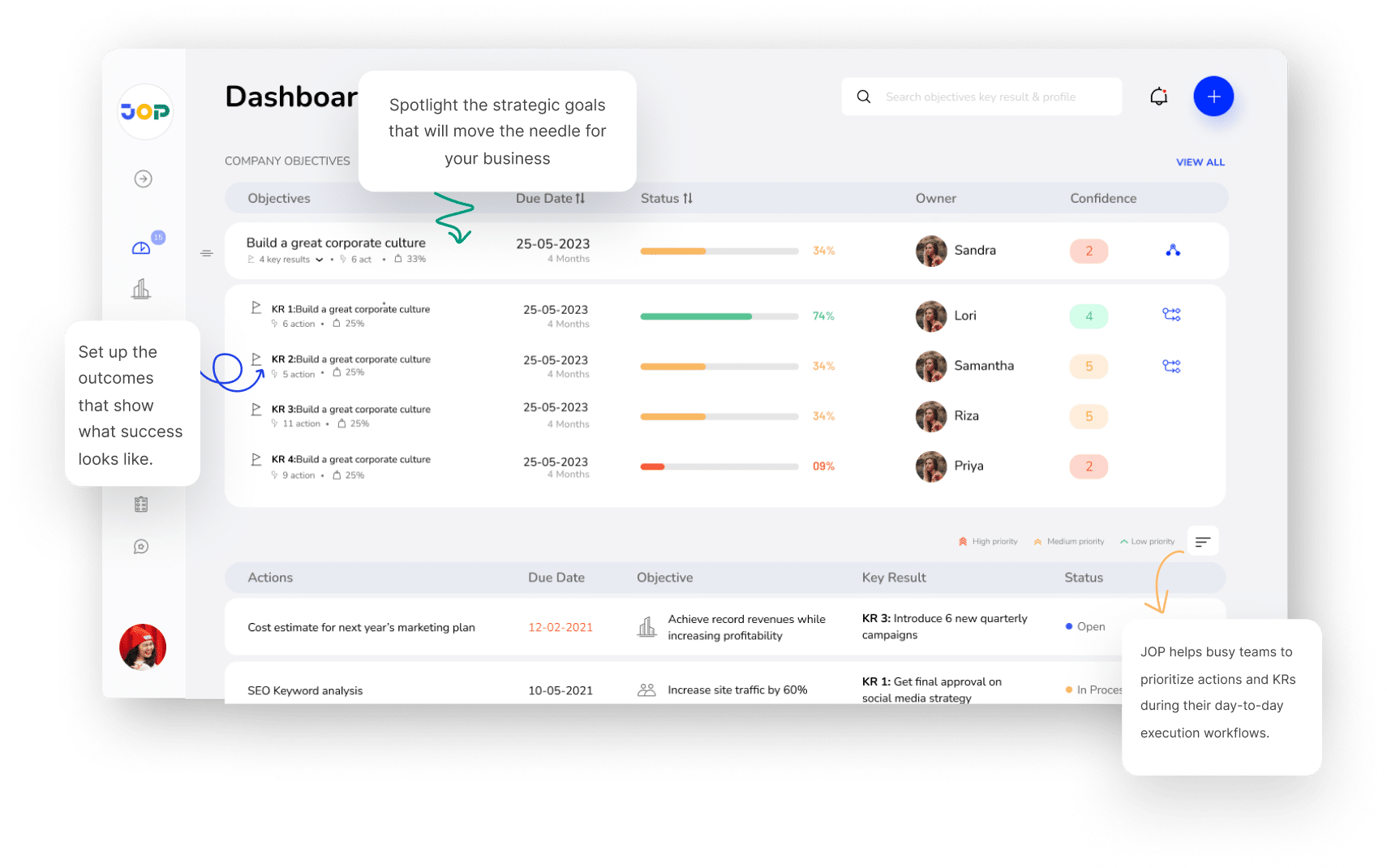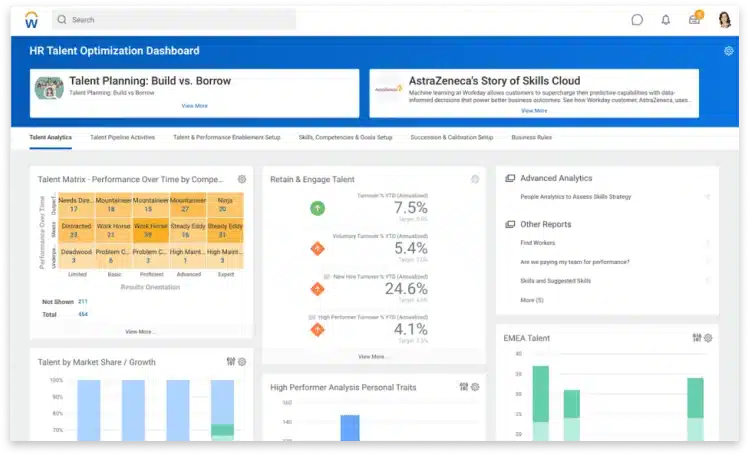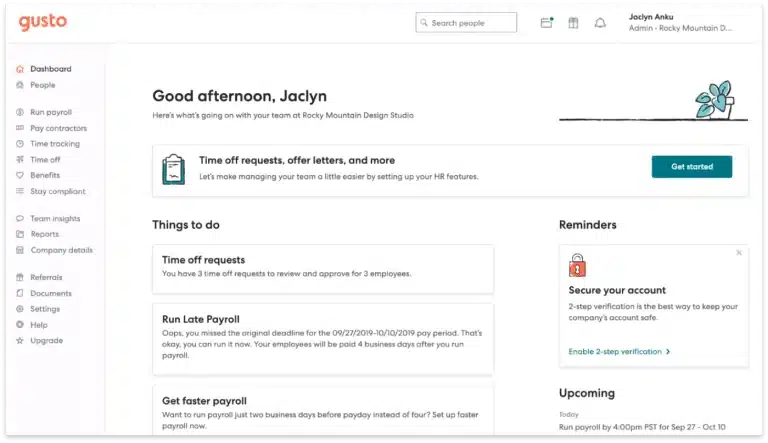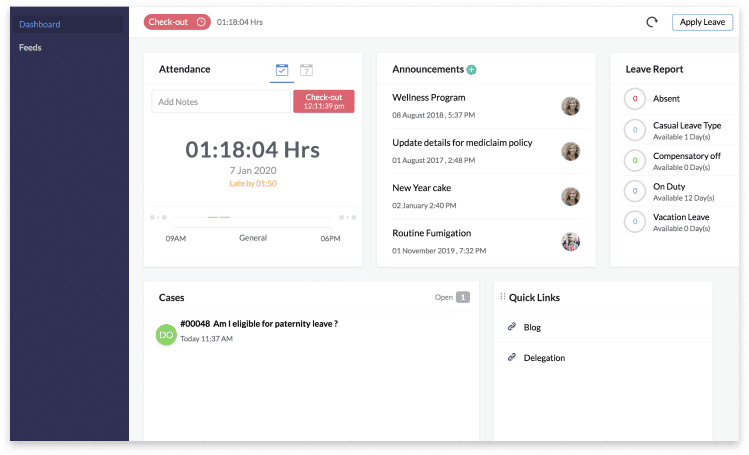Your Guide to Finding the Best HR Performance Management Software

On this page
Best HR Performance Management Software
HR performance management software simplifies how companies track, assess, and improve employee performance. It supports goal setting, performance reviews, feedback collection, and development planning, all while helping align each employee’s efforts with the company’s bigger goals. Key features typically include goal-setting tools, review workflows, feedback systems, and support for growth and development.
What Is HR Performance Management Software?
At its core, HR performance management software is designed to help companies support, track, and improve how their people perform at work. It’s the engine behind effective feedback, goal-setting, performance reviews, and employee growth.
Think: goal-setting, feedback, check-ins, reviews without the messy spreadsheets or awkward once-a-year convos. The good ones make it easy to keep things on track without it feeling like a boring corporate ritual.
Bottom line? It helps your people do great work and feel good about it. Win-win.
The Value It Brings to Your People and Business
Improved Employee Performance
When goals are clear and feedback is consistent, employees have a better sense of what’s expected and can focus on growing and improving in the right direction.
Higher Engagement
Ongoing feedback and personalized development plans help keep employees motivated, involved, and connected to their work.
Stronger Alignment
It ensures everyone’s efforts support the company’s bigger picture, leading to better teamwork and stronger business results.
Smarter, Data-Driven Decisions
With clear performance data, companies can make more informed choices around promotions, compensation, and talent development.
Must-Have Features for Smarter Performance Management
Goal Setting
Helps set clear, measurable goals for individuals and teams, keeping them aligned with the company’s overall objectives.
Performance Reviews
Makes performance reviews more structured and efficient, using data to guide meaningful conversations.
Feedback Collection
Encourages ongoing feedback from managers, peers, and even customers — helping build a culture focused on growth and improvement.
Development Planning
Supports employee development by offering tools and resources for training, upskilling, and long-term career planning.
Data Analysis
Provides insights through analytics and reporting, helping track progress, spot patterns, and make smarter decisions.
Why HR Performance Management Softwares Are Important?
Performance management is often seen as tedious, bureaucratic, or worse, pointless. But with the right software, it becomes a strategic powerhouse. It helps teams stay aligned with business goals, surfaces roadblocks early, and keeps everyone in sync with real-time feedback and clear expectations.
HR performance software doesn’t just benefit HR it supports managers in leading more effectively and helps employees grow in ways that actually matter. That’s the real magic: it turns performance into something continuous, collaborative, and genuinely useful. Not a once-a-year paperwork fest.
List of Top HR Performance Management Tools
Below are 10 leading HR performance management systems to consider in 2025.
| Software | Best For | Pricing Details | Key Features |
|---|---|---|---|
| JOP (Joy of Performing) | Clear and aligned OKR Management with emphasis on teamwork and engagement |
|
|
| Workday | Large enterprises needing scalable HCM and performance management | Base fees: $50–$150/user/month |
|
| BambooHR | SMBs seeking user-friendly HR solutions | $6–$7/user/month |
|
| Paycom | Midsize to large organizations needing comprehensive HR solutions | $24–$36 per employee/month |
|
| Gusto | Small businesses seeking integrated payroll + performance tools | Base fee: $40/month |
|
| Zoho People | SMBs needing customizable, affordable HR software | Essential HR plan: $1.25/user/month |
|
| SAP SuccessFactors | Enterprises requiring full talent management solutions | Employee Central: $6.30/user/month Payroll: ~$8.15/user/month |
|
| UKG | Organizations needing collaborative, year-round performance management | ~$30/user/month |
|
| ADP | Businesses of all sizes needing scalable HR + performance tools | Starts: $79/month + $4/user |
|
| Oracle HCM | Large enterprises needing complete HCM platforms | $13–$15/user/month |
|
I’ve rounded up the best options—features, pros, cons, and all the juicy details. Let’s find the right HR performance management software for you!
1. JOP (Joy of Performing)

Let’s start with my top pick JOP. This one’s not just another HR tool. It’s built to create a high-performing, happy workplace. JOP puts people first with features like personalized performance plans, gamified recognition, and super intuitive OKR visualizations. It’s a breath of fresh air for teams who want to go beyond the basics.
It’s not just about tracking goals JOP is about helping your people grow. Whether it’s motivating your team with recognition or visualizing progress through its constellation-style OKRs, this platform knows how to bring performance and engagement together.
What I love
Personalized performance plans for individual employees
Gamified recognition system to enhance employee engagement
Seamless integration with existing HR systems
OKR data visualization in a constellation format for easy tracking of progress
Pros
- Each employee gets a tailored performance plan.
- Gamified recognition really helps boost morale.
- Integrates easily with existing HR tools.
- The OKR constellation view makes tracking goals fun and easy.
Cons
- Might need some training for folks new to OKRs.
JOP Pricing
2. Workday

Workday is a heavy-hitter with tons of HR features packed into one platform. It’s great for teams that need deep functionality and strong data reporting, but it might feel like overkill for smaller businesses.
Key features:
Continuous feedback, scheduled evaluations, and development planning.
Pre-built and customizable dashboards with insights into headcount, turnover, diversity, and more.
Clock-in/out features, schedule tracking, and time-off requests are all integrated into the app itself.
Allows you to track leave balances, policies, and eligibility with automation and compliance support.
Pros
- It includes a full range of HR tools in one platform.
- Financial systems integrate well with it.
- It’s designed to support global teams.
Cons
- Support responses can vary in quality.
- The platform can feel overly complex.
- It lacks a free trial for hands-on testing.
3. BambooHR

BambooHR is known for its simplicity and ease of use. If you’re a small or mid-sized team looking for a clean experience and solid core features, this one’s worth a look.
Key features:
Centralized digital employee records with easy access and editing.
Request, approve, and track paid time off (PTO), sick days, and holidays.
Ensure data integrity and meet legal standards (e.g., EEO, ACA reporting).
Pros
- The interface is clean and intuitive.
- Self-service tools are helpful for employees.
Cons
- Analytics and reporting are quite basic.
- Limited options for integration and customization.
4. Paycom

Paycom is all about streamlining and automation. It’s got a little bit of everything HR, payroll, time tracking but can feel a bit complex for everyday use.
Key features:
Fully automated payroll with live-time data: hours, expenses, deductions—all integrated.
Applicant Tracking System (ATS) with e‑forms, e‑signature, background checks, and offer‑letter workflows
Digital onboarding checklists and task management help new hires complete forms before Day 1.
Learning Management System (LMS) for training, certification tracking and on-demand courses
Pros
- Payroll and HR features are tightly integrated.
- Offers decent tools for tracking attendance.
Cons
- The interface takes time to master.
- Setup can be pricey for smaller businesses.
5. Gusto

If you’re a small business owner looking for something simple and affordable, Gusto is a solid choice. It keeps things easy without sacrificing too much.
Key features:
Tracks hours, vacation, sick days, and PTO balances, integrated with payroll
Custom checklists with e-signatures, background checks via Checkr, document storage, and automated provisioning
Centralized info, lifetime access to paystubs and tax docs
Pros
- Makes payroll simple and fast.
- Friendly pricing structure for startups.
Cons
- Doesn’t scale well for growing teams.
- Lacks advanced HR capabilities.

6. Zoho People

Already using Zoho for other stuff? Then Zoho People could be a smooth fit. It gives you essential HR tools with solid integration across the Zoho ecosystem.
Key features:
Check-in/out via web, mobile GPS, IP/location controls, and biometric or facial recognition
Receive, categorize, and resolve employee queries with built‑in SLAs and knowledge bases
Log expenses, scan receipts, and streamline reimbursements via Zoho Expense integration
Pros
- Great fit if you're already in the Zoho ecosystem.
- Budget-friendly for smaller companies.
Cons
- The platform can feel a bit overwhelming at first.
- Might not meet the needs of larger organizations.
7. SAP SuccessFactors

This one’s built for big players. SAP SuccessFactors comes loaded with features for everything from learning to compensation. But with that power comes complexity.
Key features:
Track work hours, leave, absences, and shifts with built-in compliance and automation.
Job posting, candidate management, interview scheduling, and offer letters.
Deliver courses, certifications, and training paths. Integrates with content providers like LinkedIn Learning.
Track goals, provide real-time feedback, 1:1 check-ins, and coaching support.
Pros
- Integrates with other SAP solutions seamlessly.
- Suits enterprise-level HR processes.Suits enterprise-level HR processes.
Cons
- Takes time to learn and implement.
- The cost may be high for mid-sized teams.

8. UKG

UKG stands out with its focus on employee engagement. It has strong tools for performance reviews and time tracking, but it can be a bit much to set up.
Key features:
Internal communication, compliance notifications, and AI-driven chatbots like Bryte and UKG Talk integrations
Generate smart shift schedules, optimize coverage, and balance labor costs with employee preferences
Capture time via desktop, mobile, terminals, or offline entry, with exception alerts and approvals to reduce errors
Pros
- Great tools for team well-being and engagement.
- Scalable for businesses with global operations.
Cons
- Onboarding the platform isn’t quick or simple.
- It can get pricey depending on your setup.
9. ADP

ADP is a long-time player in the HR space. It’s strong on compliance and offers global support, but may feel outdated in places.
Key features:
Accurate, on-time payroll with direct deposit, wage garnishments, and multi-frequency pay runs.
Centralized database for employee info, job details, and history.
Real-time dashboards on payroll, headcount, turnover, compensation, etc.
View pay slips, request time off, approve time sheets, and access HR docs.
Pros
- Offers a wide range of HR and payroll services.
- Strong compliance tracking and support.
Cons
- The interface feels outdated compared to modern tools.
- Setup and support can be inconsistent.
10. Oracle HCM

Oracle HCM provides a comprehensive HR suite with in-depth analytics. It’s powerful and well-integrated but not for the faint of heart.
Key features:
HR self-service for employees and managers to manage personal info, time off, and more.
End-to-end hiring from sourcing to onboarding.
Personalized learning paths, AI-based recommendations.
Natural language queries and visual analytics via Oracle’s embedded BI tools.
Pros
- Comprehensive set of features across HR functions.
- Works best if you’re already using Oracle software.
Cons
- The learning curve is steep.
- Customization options are more rigid than some competitors.
Other Great HR Tools to Check Out
Still exploring? Here are a few more HR performance management tools that might be worth a look:
15Five – Focuses on continuous feedback and employee development.
Lattice – Combines performance reviews, goals, and engagement surveys in one platform.
Namely – A good choice for mid-sized companies that need an all-in-one HR suite.
ClearCompany – Offers strong applicant tracking and onboarding features.
Trakstar – Specializes in performance reviews and goal setting.
Conclusion
HR is about people, not paperwork. From hiring to retiring, and managing chaos, the right hr management software brings it all together without the stress.
Choosing the right hr management software is like a cherry on a cake. The right software helps you focus on what matters to your team. Go for what is healthy for your organisation, considering all the necessary aspects.
The wrong HR tool doesn’t just slow you down, it costs you talent, time, and trust.
Frequently Asked Questions
What is HR performance management software?
HR performance management software helps companies manage employee performance, track goals, give feedback, and conduct reviews.
Is HR software only for big companies?
Not at all! Many tools like BambooHR, Gusto, and JOP are built specifically for small and mid-sized businesses.
How do I choose the right HR performance software?
Think about your team size, budget, and what features matter most like goal tracking, integrations, or recognition tools.
Do these tools integrate with existing HR systems?
Most do, but the level of integration varies. It’s always a good idea to double-check that your must-have tools will work together.
- Auto-create OKRs in minutes
- Real-time team progress tracking
- Built-in check-ins, nudges & 1:1s
Related Posts
View All
 Nishant Ahlawat
Nishant Ahlawat